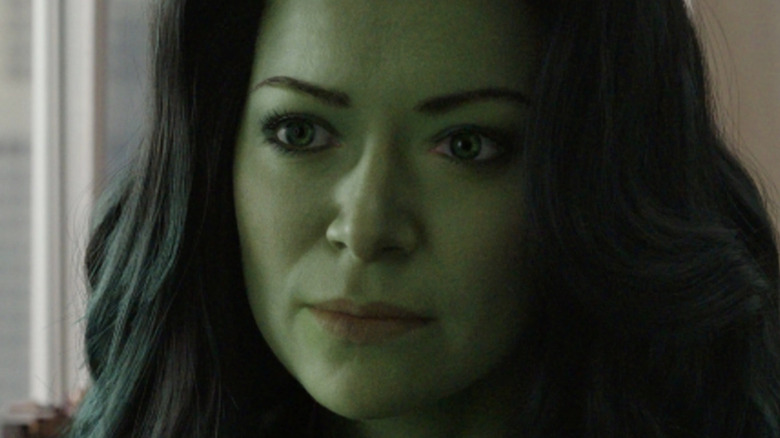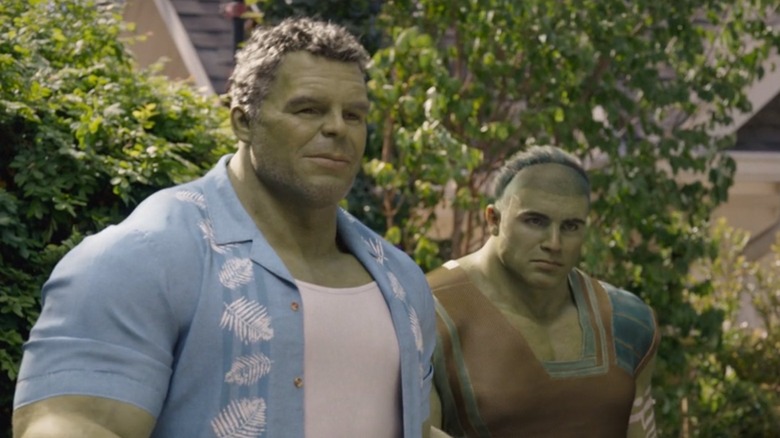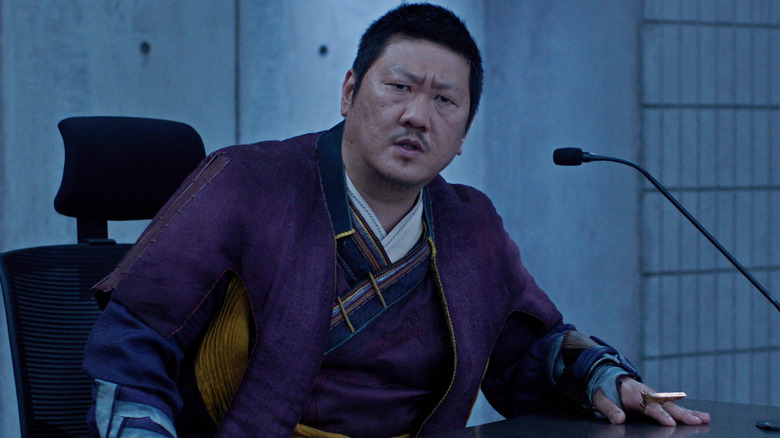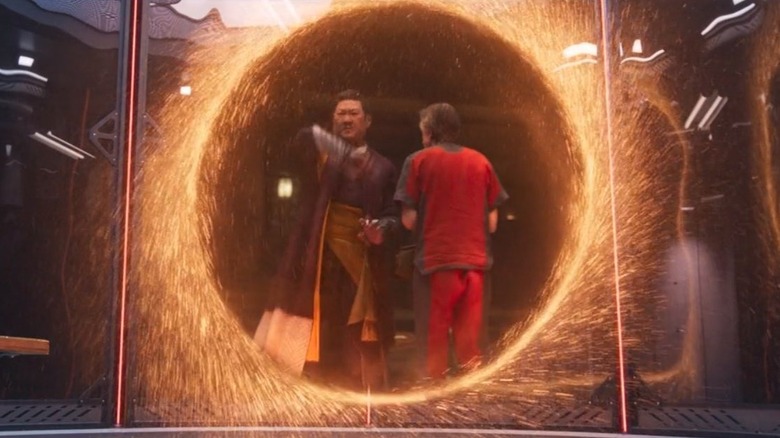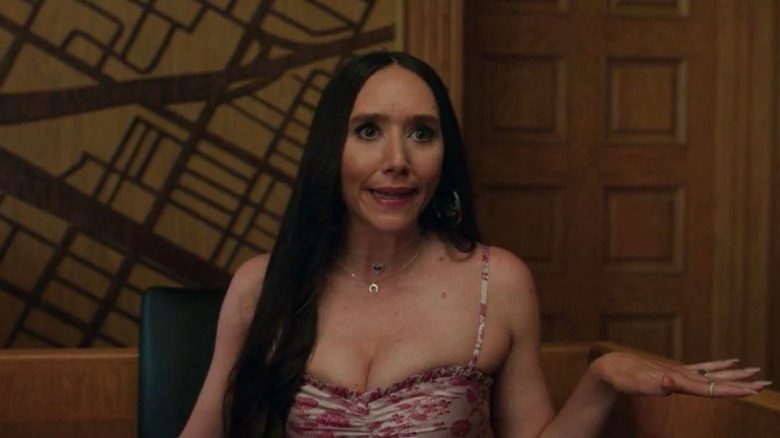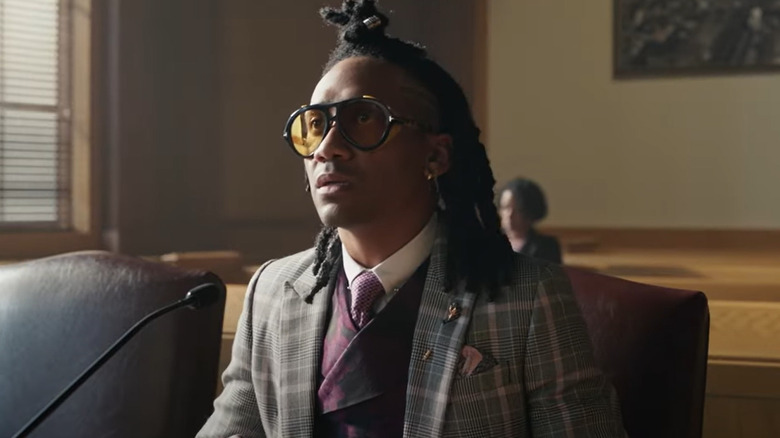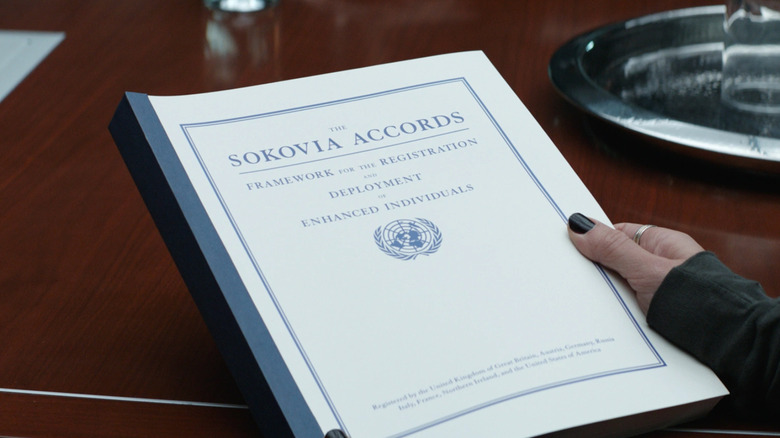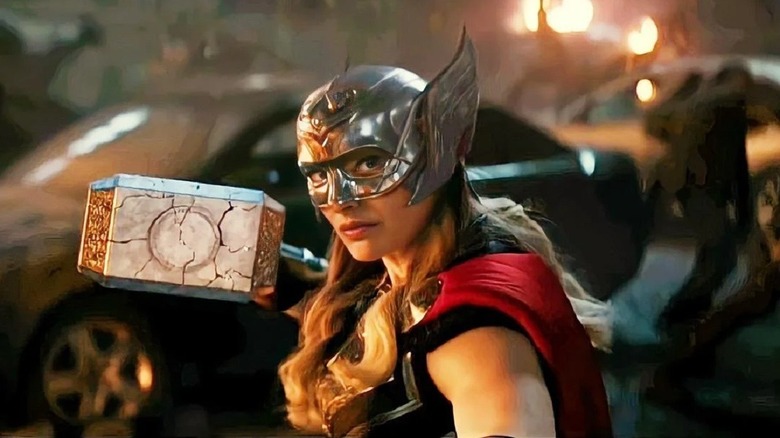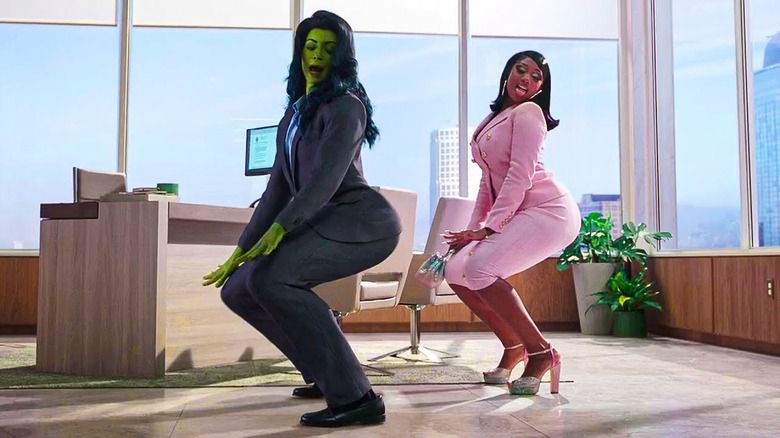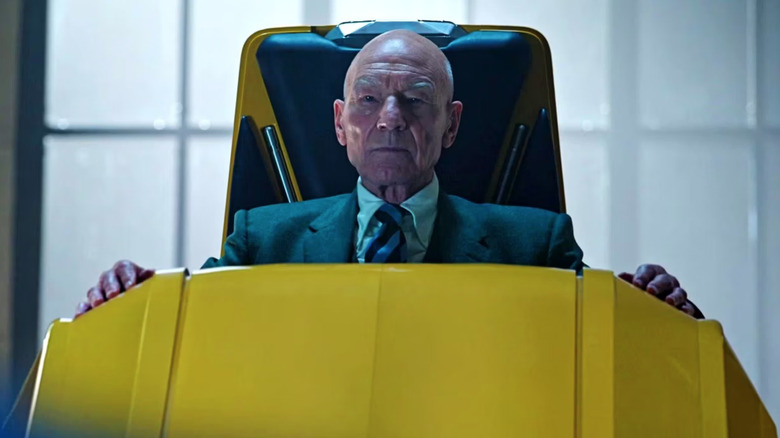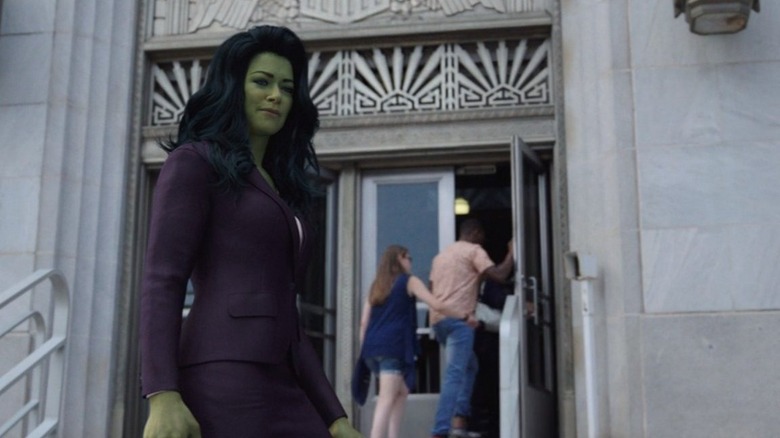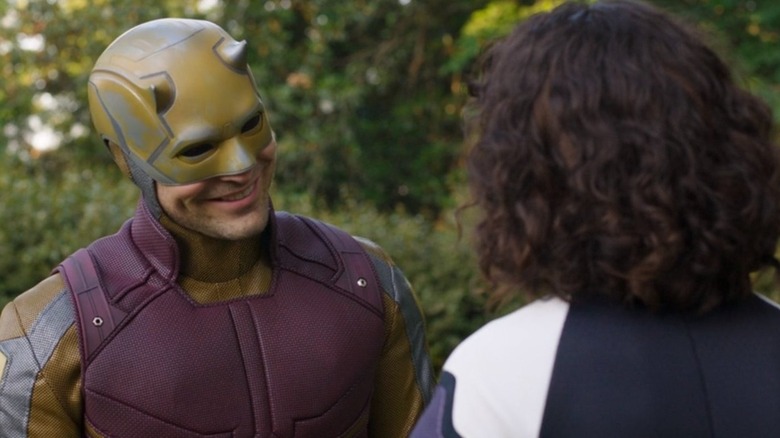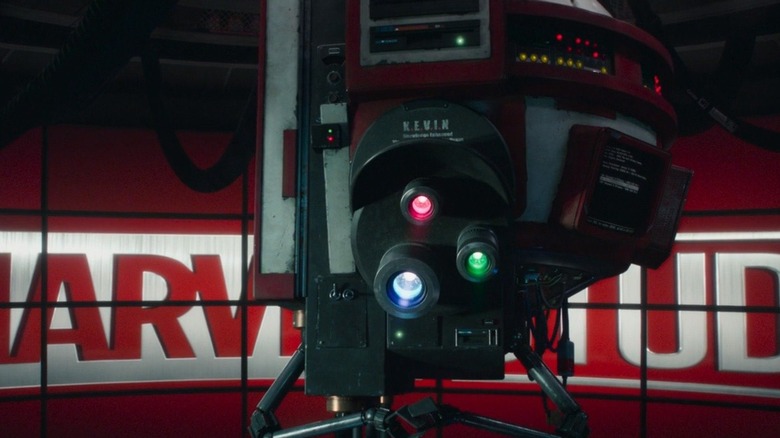Biggest Unanswered Questions In She-Hulk: Attorney At Law
Warning: This article contains spoilers for "She-Hulk: Attorney at Law."
"She-Hulk: Attorney at Law" has been a breath of fresh air for the Marvel Cinematic Universe, breaking from the franchise's typical formula for an episodic lawyer comedy that goes in wacky meta directions while also addressing serious issues about sexism. The result is a season of television that feels mostly satisfying and self-contained – but that doesn't mean that it answers all of our questions.
Some of these questions are asked directly within the show itself, teasing action offscreen that has yet to be addressed directly onscreen as well as setting up different paths for potential future adventures. Other times, the show leaves us with questions due to weird inconsistencies in the writing and worldbuilding, though these issues could also be potentially addressed in the future. Here are the 12 most burning questions we're left with after the end of Season 1 of "She-Hulk: Attorney at Law."
What happened with Hulk on Sakaar?
Bruce Banner goes through his own parallel storyline throughout "She-Hulk: Attorney at Law," which the audience only catches minimal glimpses of while focusing on his cousin Jennifer Walters. In the show's pilot episode, "A Normal Amount of Rage," Jen and Bruce get in a car accident caused by an incoming spaceship from Sakaar, the planet where Bruce spent two years as a gladiator in his original Hulk form. This accident, and the resulting cross-contamination of blood, is what gives Jen her own Hulk powers.
In Episode 2, "Superhuman Law," Jen calls her cousin while he is aboard the Sakaarian ship and preparing to travel off-world for the remainder of the season. Bruce returns to Earth in the season finale, "Whose Show Is This?" At the family gathering towards the end of the episode, he promises he's going to tell everyone what happened on Sakaar, but before he can give the details (we don't get any in the show), he reveals that someone else has come along with him — his son, Skaar.
In the comics universe, Skaar is the child of The Hulk and Sakaarian shadow warrior Caiera, and he was created in 2007 by Greg Pak and John Romita Jr. Marvel Studios hasn't made a Hulk-focused movie since 2008's "The Incredible Hulk" due to Universal holding distribution rights, but we're sure to get Bruce and Skaar's story in some form eventually.
Is Wong above the law?
In "She-Hulk: Attorney at Law" Episode 3, "The People vs. Emil Blonsky," Sorcerer Supreme Wong testifies at Emil's parole hearing to explain how and why The Abomination escaped from prison. Wong admits that he freed Emil from prison in order to fight him (as seen in "Shang-Chi and the Legend of the Ten Rings"), feeling The Abomination would serve as a worthy foe to fulfill his training to become Sorcerer Supreme. Wong's testimony helps Jen win Emil's parole case ... and is also technically a confession to a crime, so Wong portals out before he can be arrested for helping a convicted felon escape from prison.
This makes it all the more surprising that Wong is the plaintiff in the next episode, "Is This Not Real Magic?" You'd think a guy who fled the scene after confessing to a crime wouldn't want to step foot in a courtroom so soon afterwards, but there he is, suing Donny Blaze for unethical use of the Mystic Arts. Presumably some sort of arrangement must have happened offscreen between episodes, or otherwise this would feel like a significant plot hole. Perhaps being the Sorcerer Supreme grants Wong some level of diplomatic immunity in a situation like this one?
Why did Wong free Abomination the second time?
If Wong does indeed have some sort of diplomatic immunity, he sure is testing it in the mid-credits scene of the "She-Hulk: Attorney at Law" season finale. Breaking Emil Blonsky out of maximum-security prison the first time might have been necessary for the greater good. Doing so a second time, after Emil's dealings with Intelligencia clearly violates the parole Wong helped him earn, feels a lot more questionable.
We're not saying Wong necessarily has nefarious intent in all this (although, an Evil Wong would make a heck of a twist for the next "Doctor Strange" movie). It does, however, seem like a lack of judgement on his part. Is it really necessary to break a pseudo-spiritual hack who gives talks for MRAs out of prison and bring him to Kamar-Taj? Is Emil needed for something important, or are they just going to hang out and binge TV shows together? Wong's unlikely friendship with Emil is amusing, but it leaves us with a lot of questions about just how many laws Wong is willing to break for the sake of it, as well as whether Emil is actually worthy of such a friendship.
Will we see Madisynn King again?
The episodic nature of "She-Hulk: Attorney at Law" means there are a lot of characters we only got to see for one episode. The show's one-off characters include a number of eccentric super-humans like Donny Blaze, Mr. Immortal, and Man-Bull, as well as comedic civilian guest stars like Patti Harrison as Lulu and Megan Thee Stallion as herself. It's one of these ordinary civilians — Madisynn King, a party girl played by Patty Guggenheim — who has become the surprise breakout character among fans.
This woman with a uniquely spelled name ("with two Ns and one Y, but it's not where you thiiiink... ") has so far only appeared in Episode 4, where she gets accidentally transported to another dimension, makes a deal with a demon, and spoils "The Sopranos." With all the memes playing off her tipsy comedic delivery, it's clear that people want to see more of Madisynn. In an interview with Nerdist, head writer Jessica Gao expressed interest in doing more with the character, proposing a Halloween special featuring her and Wong. Should "She-Hulk: Attorney at Law" receive a second season, some sort of Madisynn return seems all but guaranteed.
What heroes are using Luke Jacobson's services?
One of the ongoing subplots in "She-Hulk: Attorney at Law" involves Jen needing to find clothes that can fit her ever-shifting frame. In Episode 5, "Mean, Green, and Straight Poured into These Jeans," her fellow lawyers Nikki Ramos and Augustus "Pug" Pugliese introduce her to Luke Jacobson, a fashion designer who specializes in superhero outfits. In Episode 8, "Ribbit and Rip It," her business with Luke is threatened when she agrees to represent Leap-Frog when he sues Luke over an allegedly faulty super-suit. (Spoiler alert: the suit works fine, and Leap-Frog is a bad guy and an idiot.)
Luke is presented as a very specialized designer, but just how specialized is his clientele? We know he's made outfits for She-Hulk, Leap-Frog, and Daredevil, but who else is commissioning him? Thus far, the MCU has made an effort to explain just about every costume its heroes wear — they're generally designed by specific technologically gifted heroes (e.g. Iron Man, Ant-Man), or they're culturally relevant uniforms (e.g. Captain America, Black Panther), or they come from space (e.g. Thor, Captain Marvel). It seems unlikely that Jacobson has designed costumes for any Avengers. Presumably, his business is kept afloat by heroes we've never heard of before — after all, who but the most intensely dedicated Marvel zombie had heard of Leap-Frog before this show?
When did the Sokovia Accords go away?
The Sokovia Accords, enacted back in "Captain America: Civil War," are a set of documents written by the United Nations that placed superheroes under governmental regulation and control. Approved of by Tony Stark but opposed by Steve Rogers, these rules split the Avengers between those working with government approval and those operating illegally. We saw them enforced as recently as "WandaVision," but in "She-Hulk: Attorney at Law" Episode 8, Matt Murdock casually mentions that the Sokovia Accords have been repealed.
What exactly ended the Accords? Maybe Marvel will flesh out this political story in a future project, or maybe they will just use this helpful bit of throwaway dialogue as a reason to never mention the Sokovia Accords ever again; the two scenarios feel equally plausible. Even if we never get official answers, however, it seems easy enough to formulate personal theories about what happened. One would presume that the events of "Avengers: Endgame," where the world is saved by governmentally approved and unapproved heroes alike, would lead to more people second-guessing the value of the Accords.
Where does this fit with Thor: Love and Thunder?
In the season finale, Pug infiltrates a secret Intelligencia meeting on Nikki's behalf. He quickly discovers that forum leader "HulkKing" is Todd Phelps, one of Jen's unsuccessful dates and GLK&H's clients. This crowd of terminally online misogynists commiserate about their shared hatred of female superheroes ("but not because they're female"), focusing primarily on She-Hulk but also throwing in some complaints about "Lady Thor" which calls into question how exactly "She-Hulk: Attorney at Law" intersects with the events of "Thor: Love and Thunder" in the timeline.
Jane Foster, who officially goes by the name Mighty Thor rather than "Lady Thor" while wielding Mjolnir, is only active as a superhero on Earth for a very limited time before heading to space and ultimately dying of cancer. It's possible this episode is taking place shortly after Jane gets her powers, though how much the public at large would know about her at this point is a question. People would definitely know a lot about Mighty Thor after her death as she's immortalized as a statue in New Asgard, but then why would the Intelligencia refer to her in the present rather than past tense? Perhaps the simplest explanation is that the Intelligencia guys aren't even referring to Jane — they're talking about Valkyrie, who replaced Thor as King of Asgard but never actually takes on Thor's thunder powers the way Jane does.
Where did the credits scenes go for Episodes 5 through 8?
"She-Hulk: Attorney at Law" includes a mid-credits scene for each of its first four episodes (which just so happened to be the four sent to critics in advance for review) as well as its final episode. These credits scenes, used for jokes much more than for teasing future events, work as a fitting mid-point between the expectations of Marvel content and the credits tags common in other sitcoms. Most memorably, these scenes include the reveal that Steve Rogers definitely was not a virgin and the Megan Thee Stallion twerking scene that the Internet will never shut up about.
So it's pretty weird that this part of the format just disappears for Episodes 5 through 8, right? It would be one thing if credits scenes were offered as a special treat sporadically throughout the season but including them in the first four episodes sets an expectation that the rest of the series doesn't follow through on. Furthermore, including them in five out of nine episodes means the majority of episodes include a mid-credits scene, so why are there no such scenes in the middle four episodes?
How long can Marvel keep teasing the X-Men?
When She-Hulk confronts KEVIN, the robot controlling the MCU that is definitely not Kevin Feige, she has a lot of questions to ask. Some are about her own story, others are about repetitive themes within the MCU. She asks one question that's been on the minds of basically every MCU fan since 2019: "When are we getting the X-Men?" KEVIN responds that he cannot answer that, but in real life, Kevin Feige knows he's going to have to give us some sort of answer eventually.
Marvel Studios doled out quite a few X-Men teases in 2022. "Doctor Strange in the Multiverse of Madness" includes an extended cameo by Patrick Stewart as Professor Charles Xavier. The season finale of "Ms. Marvel" reveals that Kamala Khan is actually a mutant in her MCU incarnation, making her the first of likely many more such characters to come.
What's next? Namor, Marvel's "first mutant" in the comics, is apparently the primary antagonist of "Black Panther: Wakanda Forever," and it is possible other mutants will show up throughout the studio's 2023 slate. For the first X-Men-focused story in the mainline MCU, however, it seems likely we'll have to wait until at least "Deadpool 3" set to arrive to theaters on November 8, 2024.
Was that ending a bit too easy?
The penultimate episode of "She-Hulk: Attorney at Law" ended on an unusually heavy note: just as She-Hulk is receiving her Female Lawyer of the Year award, the Intelligencia broadcast the contents of her phone, as well as a video of her and Josh Miller having sex, to which she responds with some serious smashing rage and ends up arrested by the Department of Damage Control. The subject of revenge porn and the ways in which victims of abuse are punished for fighting back against abusers is some pretty heavy material for a Disney+ show.
In the finale, we basically got the easy wish-fulfillment ending. After She-Hulk breaks the fourth wall to demand a rewrite on an increasingly ridiculous action climax, things ultimately wrap up quietly with the trolls caught and She-Hulk free to resume her law career. On one hand, the meta aspects of the ending are hilarious and in-character, and it doesn't end up saying anything negative. On the other hand, isn't it a bit weird to bring up so many heavy issues only to ultimately say so little about them? Of course, there are limits to how much the writers could say about such material in a Marvel sitcom, but whether or not the ending is too easy to be fully satisfying is subject for fair debate.
What's next for Daredevil and She-Hulk?
Out of all the major guest appearances on "She-Hulk: Attorney at Law," the most intensely hyped up was easily the return of Matt Murdock, aka Daredevil, to the MCU. The show takes its time teasing his role, revealing his costume as early as Episode 5, but not actually having him show up until Episode 8. When he does return, it absolutely lives up to high expectations. Matt, who's split his time as a lawyer and a vigilante superhero for quite a while now, makes him a perfect counterpoint to Jen still figuring out how to balance her legal work with her identity as a Hulk. Seeing Daredevil and She-Hulk in action together was pure comic book-y fun – and then the two heroes getting some action with each other was a great antidote to the typical sexlessness of the MCU.
While rewriting her ending in the season finale, She-Hulk makes sure that Daredevil returns. While both characters are known in the comics for having one-night stands, it seems there's genuine potential for their MCU counterparts to share a longer-lasting relationship. Will this be addressed in the upcoming "Daredevil: Born Again" Disney+ series? While Daredevil's own series will likely have a significantly darker tone than She-Hulk's, we're curious how this aspect of the character's development gets worked into his solo series.
Did KEVIN truly ban She-Hulk from the big screen?
When KEVIN is finished talking to She-Hulk, he tells her "Okay, now get back to the show. See you on the big screen." She-Hulk replies, "Really?" To which the robot producer answers, "No." Taken at face value, that sounds pretty definitive; the overlords of the MCU aren't going to put Jennifer Walters into a movie and are keeping her on the Disney+ side of the universe. But how seriously can we really take a self-mocking, fourth-wall-breaking joke?
If we're just talking about starring roles, then it seems completely fair to keep She-Hulk on TV. It's clear from this first season that the television format is a perfect fit for the character; her work as a lawyer lends itself to "case of the week" storylines better than the blockbuster demands of the theatrical MCU. But part of the appeal of having the Marvel movies and shows share a universe is the idea that characters from the shows can and will get the chance to appear in the movies, and She-Hulk could easily make a strong supporting character in future films. At the very least, it's easy to imagine the possibilities for She-Hulk to appear alongside the similarly fourth-wall-breaking Deadpool when he makes his grand return to the big screen.
